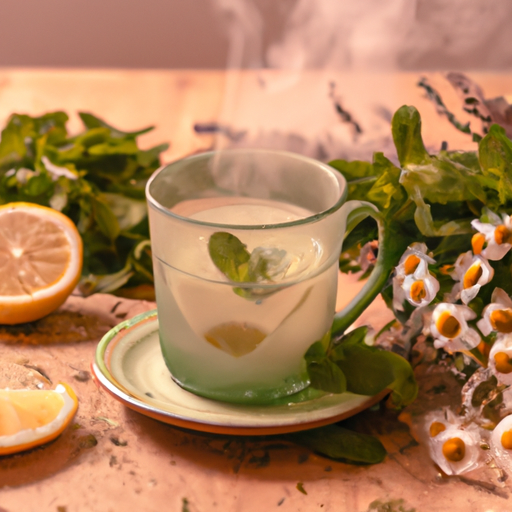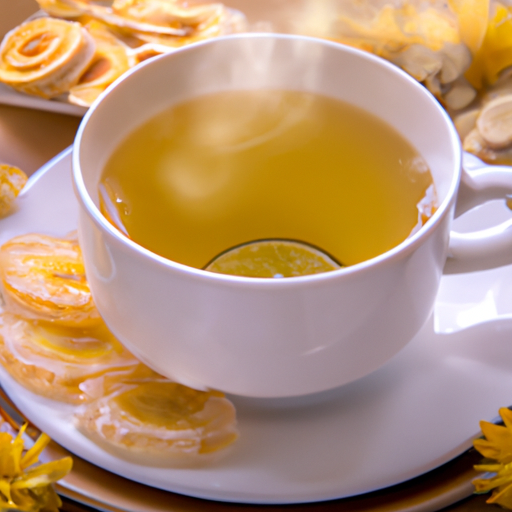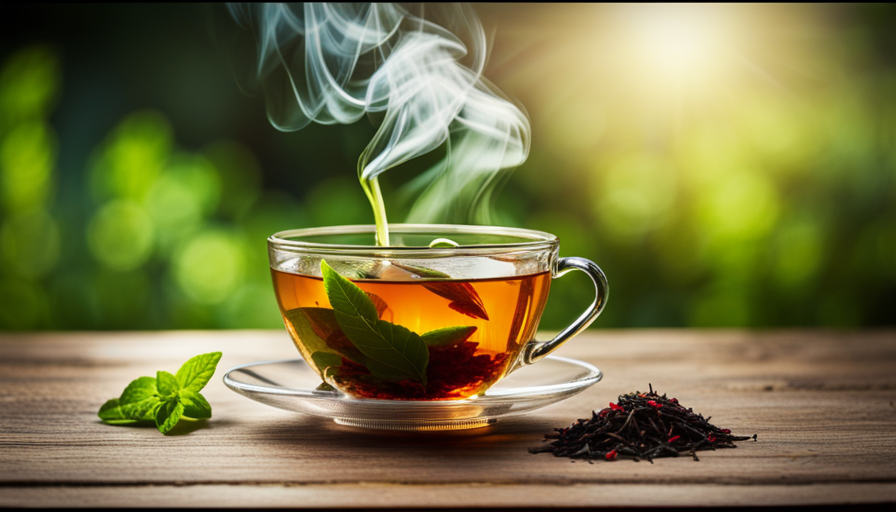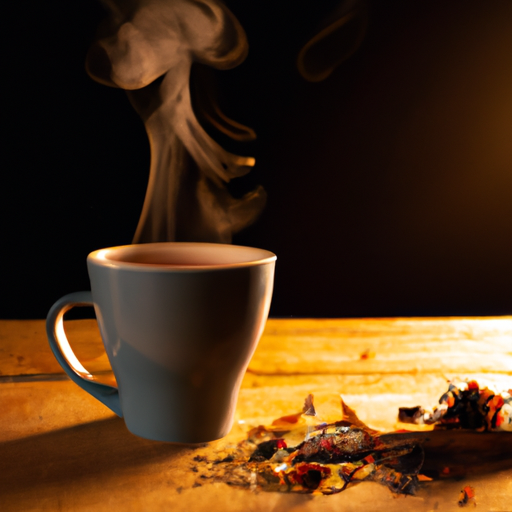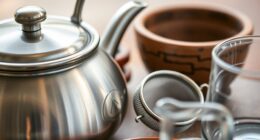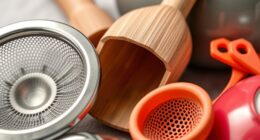As I sit here, savoring the warm embrace of my favorite mug, I am reminded of the simple pleasures in life. There is something magical about that first sip of herbal tea, the way it soothes my soul and calms my mind.
If you’re like me, a tea enthusiast seeking solace in a mug, then this article is for you. Today, I will guide you through the art of making herbal tea in a mug, a delightful ritual that brings comfort and joy. With just a few simple steps, you can create your own homemade blend, tailored to your taste buds and preferences.
So, let’s gather our ingredients, boil some water, and embark on a journey of flavors and aromas. Get ready to indulge in the perfect cup of herbal tea, right from the cozy confines of your favorite mug.
Key Takeaways
- Choose from a variety of herbal tea options such as chamomile, peppermint, lavender, and ginger.
- Use a comforting mug to enhance the tea-drinking experience.
- Boil water using a stovetop kettle, electric kettle, or microwave, preferably with filtered water for better taste.
- Preheat the mug to the desired temperature and select the perfect blend of herbs to create a flavorful cup of herbal tea.
Gather Your Ingredients and Supplies
Now, grab your favorite mug and gather all the ingredients and supplies you’ll need to make a soothing cup of herbal tea.
Choosing the right herbs for your homemade tea is crucial to achieving the perfect flavor and desired health benefits. Look for high-quality loose herbal tea leaves or tea bags at your local grocery store or specialty tea shop. Some popular herbal tea options include chamomile, peppermint, lavender, and ginger.
Additionally, consider finding the perfect mug for your tea drinking experience. Whether it’s a large, cozy mug or a delicate tea cup, choose one that brings you comfort and joy.
Now that you have your mug and herbs ready, let’s move on to the next section and explore how to choose your herbal tea blend.
Choose Your Herbal Tea Blend
First, select the perfect blend of herbs that’ll transport your senses and nourish your soul.
There are many different types of herbal tea blends to try, each with its own unique combination of flavors and benefits. Whether you prefer a calming chamomile and lavender mix or an invigorating ginger and lemon blend, the options are endless.
Herbal teas offer a multitude of health benefits, such as boosting the immune system, aiding digestion, and promoting relaxation. They’re also caffeine-free, making them a great alternative to traditional tea or coffee.
Now that you’ve chosen your herbal tea blend, it’s time to move on to the next step: boiling water.
Boil Water
After selecting your perfect herbal tea blend, it’s time to heat up the water to a gentle boil. This will create a soothing elixir that will warm both your body and soul. Boiling water is a crucial step in the process of making herbal tea as it helps to extract the flavors and therapeutic properties of the herbs.
There are different methods to boil water, such as using a stovetop kettle, an electric kettle, or even a microwave. However, no matter which method you choose, it’s important to use filtered water. Filtered water removes impurities and chlorine, enhancing the taste and quality of your herbal tea.
So, grab your preferred method of boiling water and get ready to prepare your mug for the next step of the tea-making process.
Prepare Your Mug
To get ready for the next step, it’s essential to ensure your chosen vessel is clean and warmed up, creating the perfect environment for the infusion of flavors to take place.
Choosing the right mug plays a crucial role in the overall tea experience. Opt for a mug made of ceramic or glass, as they retain heat better than other materials. Additionally, make sure the mug is clean and free from any residual flavors that may affect the taste of your herbal tea.
Once you have the perfect mug, temperature control becomes important. Preheating the mug with hot water for a few minutes before adding the tea helps maintain the desired temperature throughout the brewing process. This ensures that the flavors are extracted properly.
Now that your mug is prepared, let’s move on to steeping your tea.
Steep Your Tea
Now that you’ve got your perfect vessel all warmed up, it’s time to let those delightful flavors steep and dance their way into your taste buds. Steeping herbal tea is a simple yet essential process that brings out the full potential of the herbs. Here are four different steeping methods to choose from, each offering a unique experience:
-
Hot Water Steeping: Pour hot water over the tea leaves and let them steep for 5-7 minutes. This method extracts the flavors quickly and is perfect for stronger herbal teas.
-
Cold Water Infusion: Place the tea leaves in cold water and let them steep in the refrigerator overnight. This gentle method preserves delicate flavors and is ideal for milder herbal teas.
-
Sun Tea Brewing: Place the tea leaves in a jar filled with water and let it sit in direct sunlight for a few hours. This method creates a refreshing and subtly flavored tea.
-
Double Boiling Method: Fill a pot with water and place your mug with tea leaves in it. Heat it slowly until the water simmers, then let it steep for 15-20 minutes. This method produces a concentrated and robust tea.
Herbal tea offers numerous benefits for relaxation, such as reducing stress and promoting calmness. The natural properties of herbs can soothe both the body and mind, creating a sense of tranquility.
Now that your tea is steeping, it’s time to move on to the next step – adding sweeteners or enhancements (optional).
Add Sweeteners or Enhancements (Optional)
Bring your herbal tea to the next level by adding a touch of sweetness or enhancing its flavors (optional). Using natural sweeteners in herbal tea not only adds a delightful taste but also provides various health benefits. Stevia, honey, and maple syrup are excellent choices as they are low in calories and offer a natural sweetness. These sweeteners can help balance the bitterness of some herbal teas, making them more enjoyable to drink. To further enhance the flavor, consider adding a slice of citrus fruit like lemon or orange, a sprig of fresh mint, or a dash of cinnamon. These additions can add depth and complexity to your tea, creating a truly delightful experience. Now that your herbal tea is infused with sweetness and flavor, it’s time to sit back, relax, and savor the fruits of your labor. Enjoy your homemade herbal tea and embrace the calming sensation it brings.
Enjoy Your Homemade Herbal Tea
Indulge yourself in the delightful flavors of your homemade herbal tea, letting its calming sensation wash over you like a gentle breeze on a summer’s day.
To enhance the flavor of your herbal tea, consider adding a squeeze of lemon or a drizzle of honey. These natural sweeteners can complement the herbal notes and create a more balanced taste. Another way to elevate the flavor is by adding a dash of cinnamon or a few fresh mint leaves. Not only will these enhancements add complexity to your tea, but they also bring their own health benefits.
Drinking homemade herbal tea can boost your immunity, aid digestion, and promote relaxation. So sit back, sip your tea, and enjoy the nourishing effects it has on your mind and body.
As you continue on your tea journey, you can experiment with different flavors and combinations to discover your own unique blend.
Experiment with Different Flavors and Combinations
Explore the vast realm of flavors and combinations, allowing your taste buds to embark on a tantalizing journey of discovery.
Herbal tea not only offers a soothing beverage, but it also provides various health benefits. Each herb possesses unique properties that can aid digestion, boost immunity, or promote relaxation.
For a refreshing twist, try combining different herbs to create your own signature blend. Pair chamomile with lavender for a calming effect or mix peppermint with lemon balm for a zesty flavor. The possibilities are endless!
Additionally, herbal tea can be used creatively in recipes. Infuse it into syrups, sauces, or even baked goods to add a subtle herbal essence.
So, embrace your inner herbalist and experiment with the incredible flavors and endless possibilities of herbal tea.
Frequently Asked Questions
Can I use fresh herbs instead of dried herbs to make herbal tea?
Yes, you can use fresh herbs instead of dried herbs to make herbal tea. Using fresh herbs not only adds a vibrant flavor to your tea but also increases the health benefits as they retain more of their natural oils and nutrients.
How long should I steep the tea for a stronger flavor?
For a strong flavor, I recommend steeping the tea for at least 5 minutes. However, steeping techniques can vary depending on personal preference. Experiment with different times to find your optimal steeping time.
Can I reuse the herbs for a second cup of tea?
Yes, you can reuse the herbs for a second cup of tea. Reusing herbs can provide additional health benefits as they release more of their nutrients during the second steeping process.
Should I cover the mug while steeping the tea?
Covering the mug while steeping herbal tea can enhance the flavor by trapping the aroma and preventing heat loss. However, using a tea infuser is beneficial as it allows the herbs to fully infuse and makes straining easier.
Can I add milk or cream to my herbal tea?
Adding milk or cream to herbal tea is a personal preference. Some people enjoy the creamy texture and added richness it brings. However, if you prefer not to use dairy, there are alternative ways to enhance the flavor of herbal tea.
Conclusion
In conclusion, making herbal tea in a mug is a simple and delightful experience. By gathering your ingredients and supplies, choosing your favorite herbal blend, and following the steps of boiling water, preparing your mug, and steeping your tea, you can create a soothing and flavorful beverage.
Don’t be afraid to add sweeteners or enhancements to personalize your tea. Remember, every cup of herbal tea is a unique opportunity to explore new flavors and combinations, bringing joy and comfort to your daily routine. Cheers to the art of homemade herbal tea!

